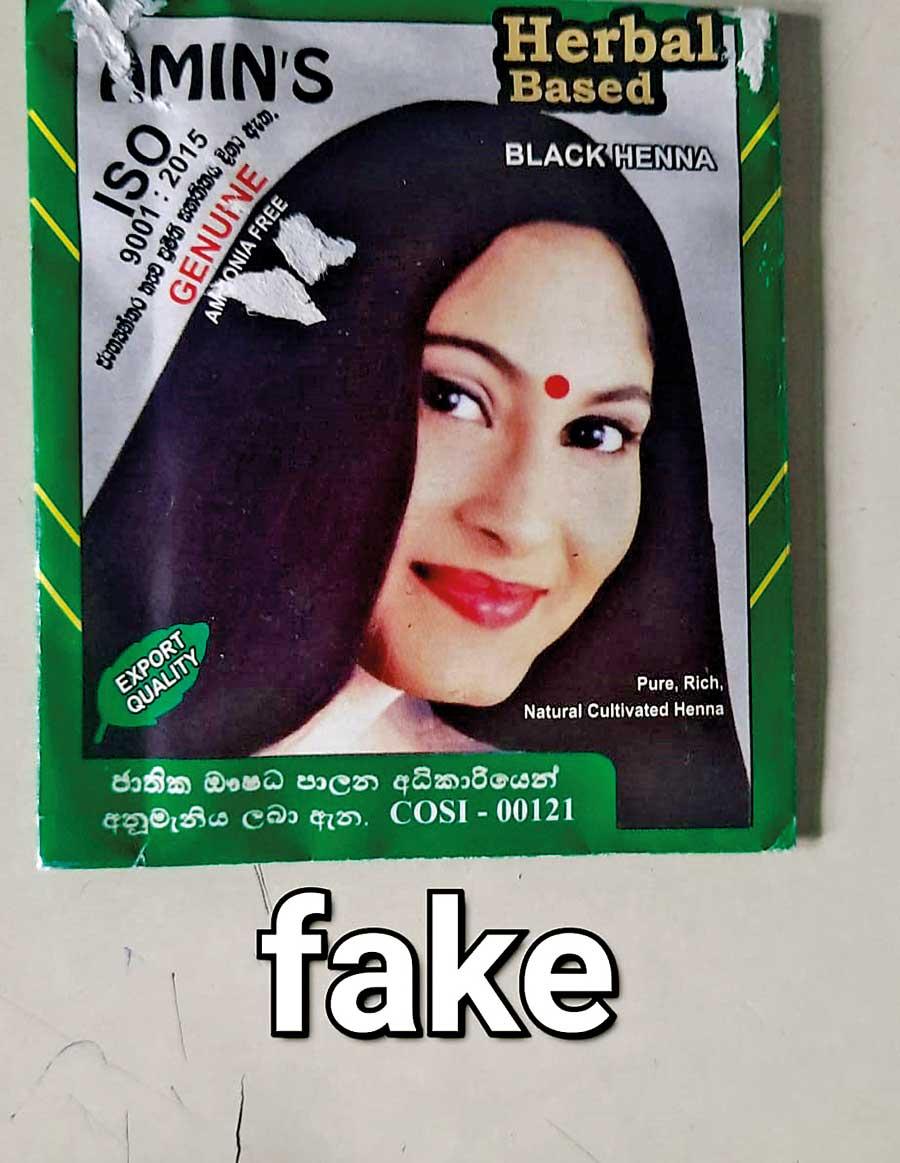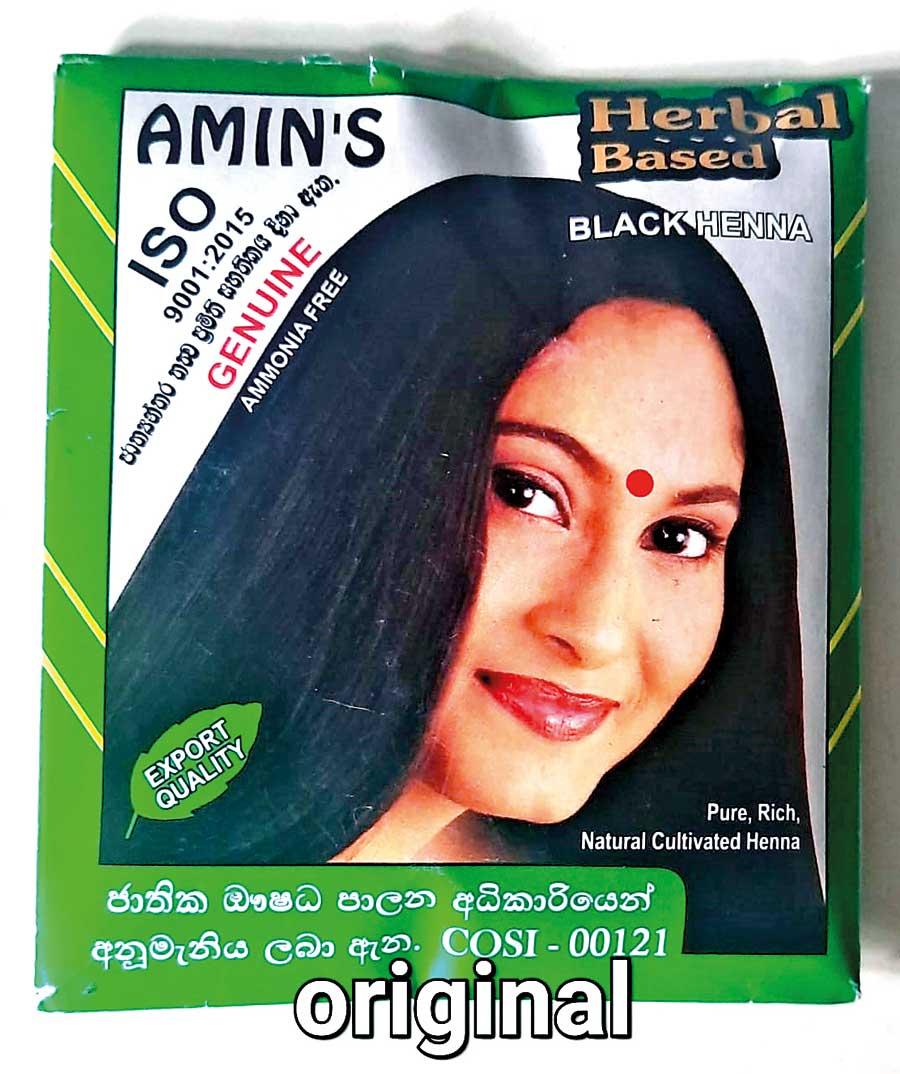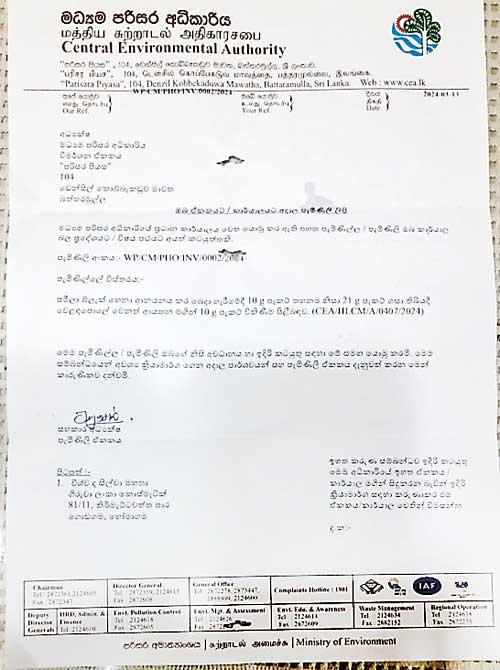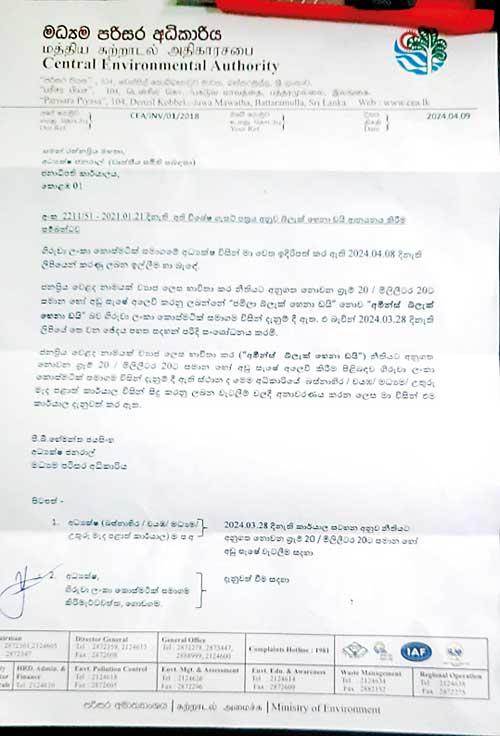Reply To:
Name - Reply Comment
Last Updated : 2024-05-18 20:50:00

The fake 10 gram packet sold in the market
In 2021, the Central Environmental Authority (CEA) planned to issue a gazette prohibiting the production of various types of plastic, including yogurt and ice cream cups. This was detailed in the Extraordinary Gazette No. 2211/51, issued on January 21, 2021 which was signed by the then Environment Minister Mahinda Amaraweera on January 19, 2021.
in the Extraordinary Gazette No. 2211/51, issued on January 21, 2021 which was signed by the then Environment Minister Mahinda Amaraweera on January 19, 2021.
The gazette imposed a ban on the production of plastic spoons, forks, yogurt and ice cream spoons and similar items. Furthermore, the Ministry of Environment implemented measures to halt the production of sachets , PET bottles storing pesticides and inflatable toys with effect from March 31, 2021. Factories manufacturing sachets were thoroughly inspected by the CEA in an attempt to prevent them from entering the market.
Even though a ban to manufacture sachets was in effect, the CEA conducted a raid on a factory situated in Jaburaliya area in Madapata, Kesbewa Divisional Secretariat, which continued
|
Vishwa de Silva |
to manufacture sachets despite the ban. The CEA took prompt legal action in July 2021 as means of enforcing the law in effect. The CEA took immediate measures to remove the sachets in question while pursuing legal action against the company responsible for producing sachets in violation of the ban that had been imposed.
However, despite previous efforts, banned sachets have been reintroduced to the market. For instance, 10 gram packets of black henna dye are visibly seen in stores for the past six months. The CEA has been accused of not taking the initiative to remove them from the market. Furthermore, these banned sachets are being distributed under the name of a prominent company known for importing black henna dye into the country.
“I discussed this matter with our board of directors. There are two laws in this country. This is a double game. The CEA is trying to shut down legitimate businesses like ours. The 10-gram black henna dye labeled as ‘Amin’s’ is not our product. This is a mafia”-
Dr. Clarence Kumarage, Chairman Charith Enterprises
If a ban on sachets is in effect, there is no possibility for 10 gram black henna dye packets to resurface in the market. If they are available, they are counterfeit products. Furthermore, the law prohibits the use of black henna dye contained in these sachets . There is nobody to take responsibility for any allergies or other potential hazards stemming from the use of black henna dye. The presence of carcinogens or other harmful chemicals in these products is unknown. There has been no investigation conducted regarding this matter. The entry of black henna dye into Sri Lanka has occurred through illegal means or as part of a fraudulent scheme disguised under the pretext of complying with the law. The CEA too has failed to enforce the law in this regard.
 Following the ban, 21 gram black henna dye packets were permitted for sale in the market. Consequently, businessmen in this sector adhered to government regulations by selling 21 gram black henna dye packets instead of 10 gram sachets . Currently, both types of black henna dye packets – one set produced in compliance with Environment Ministry standards and the other set of banned 10 gram packets- are available in the market.
Following the ban, 21 gram black henna dye packets were permitted for sale in the market. Consequently, businessmen in this sector adhered to government regulations by selling 21 gram black henna dye packets instead of 10 gram sachets . Currently, both types of black henna dye packets – one set produced in compliance with Environment Ministry standards and the other set of banned 10 gram packets- are available in the market.
Details mentioned on the banned 10 gram black henna dye sachets indicate that they are being imported to Sri Lanka by a company named Charith Enterprises with an address in Nugegoda. This company distributes 21-gram black henna dye packets in accordance with government regulations. But the same company also sells the illegally imported 10 gram black henna dye packet under the brand name ‘Amins’. This packet closely resembles their 21 gram black henna dye packet and even includes an ISO standard certificate and the National Medicines Regulatory Authority approval. Once again, the CEA has been accused of their failure to take appropriate action in this regard.
“The CEA is trying to frame us” – Dr. Kumarage
When the matter was taken up with Dr. Clarence Kumarage, Chairman of Charith Enterprises, he acknowledged the matter. “I discussed this matter with our board of directors. There are
|
Dr. Clarence Kumarage |
two laws in this country. This is a double game. The CEA is trying to shut down legitimate businesses like ours. The 10-gram black henna dye labeled as ‘Amin’s’ is not our product. This is a mafia. For the past 25 years, we have been selling henna dye that is safe for the body. We also faced significant economic challenges during the COVID-19 pandemic. Subsequently, when import restrictions were lifted, fraudsters took advantage of the situation. By fraudulently scanning our packet and using our name, they have produced counterfeit packets under our brand and have captured the market,” said Dr. Kumarage.
He further said that they had brought this matter before the CEA and had even complained in writing, but no action has been taken as yet. “We respect the government’s law. The government said that the environmental damage would be reduced when 10 gram sachets are banned from the market. But this decision seems illogical. Typically, only 10 grams of dye is used in the dyeing process. When using a 21 gram packet, the remaining amount of unused dye is wasted as it doesn’t have the same quality as dye that comes in a sealed pack. This affects consumers’ budget as well. In an attempt to address this, we proposed separating the 21 gram packet into two equal portions of 10.5 grams each, marked by a dotted line. However, the CEA did not approve of this solution,” Dr. Kumarage continued.
He further said that this law was introduced by an economic impostor who damaged our country’s economy. “While we abide by government regulations, the implementation of this law has allowed fraudsters to take control of our market. As a result, our businesses are now facing imminent closure. When I raised this issue with the CEA, they said that they would seize fake products. However, after they apprehended them, they told the media that they seized ‘Amin’s’ products leaving our company even more affected. They do not say that they seized fake products under the brand name ‘Amin’s’. Fraudulent companies take advantage of this situation. This is why I said there are two laws in this country. We therefore request authorities to conduct a fair investigation and seize any fake products in the market,” Dr. Kumarage urged.
Echoing similar sentiments, Vishwa de Silva, Director of Giriva Lanka Cosmetic Company said that prior to the implementation of this ban, his Company had placed an order to purchase 10 gram sachets from India. “But when we received the order in July 2021, the ban on sachet packet black henna dye was in effect. Respecting the government’s laws, we stored these items in our warehouses but refrained from releasing them to the market. Subsequently, we spent more money to import 21 gram black henna dye packets. Despite this, the CEA visited our warehouses and indicated their intention to enforce the law, but we didn’t release a single packet to the market,” said De Silva.
“When we received the order in July 2021, the ban on sachet packet black henna dye was in effect. Respecting the government’s laws, we stored these items in our warehouses but refrained from releasing them to the market. Subsequently, we spent more money to import 21 gram black henna dye packets”
- Vishwa de Silva, Director of Giriva Lanka Cosmetic Company
He further said that even though we were instructed against releasing our products into the market, there are 10-gram black henna dye packets under the brand name ‘Amin’s’. “That company itself is unable to locate the source of these packets. These fake products have caused significant issues in our market. When we raised this issue with the CEA, they responded by stating that they cannot issue a letter to remove products bearing a fake name. When I raised this issue again, the CEA informed me that there were fake 10-gram black henna dye packets bearing the name ‘Jamila’ in the market, and instructed to seize them. However there were no fake 10-gram black henna dye packets in the market under that name,” De Silva added.
The Director General of the CEA issued a directive to the Assistant Director of Complaint Unit on 13-03-2024 (Letter No. WP/CM/PHO/INV/0002/202) instructing the unit to conduct an investigation into the presence of fake 10-gram black henna dye packets in the market.
In response to this, in Letter No. CAE/INV/01/2018 dated 28-03-2024, PB Hemantha Jayasinghe, Director General of the CEA, responds to a letter sent by Saman Ratnapriya, Director General of Trade Unions to the President on 18-03-2024. The letter states that Giriva Lanka Cosmetics has issued 10 gram black henna dye packets into the market under the brand name ‘Jamila’ while instructing the relevant units to seize the products and apprehend officials linked to the company as means of enforcing the law. Copies were sent to Vishwa de Silva and CEA provincial offices.
The fact that 10 gram black henna dye packets were initially available in the market under the brand name ‘Amins’ and a subsequent letter with CEA Director General’s name to seize products coming under the brand name ‘Jamila’ had raised considerable doubts among industry stakeholders.
“We can’t raid all fake products in the country” – CEA official
When questioned about this matter, a chief officer of the CEA’s Raid Unit stated that he lacked the authority to provide information regarding it. However, he confirmed that a letter had been sent by mistake to the provincial offices instructing them to confiscate the banned products under the name of Jamila, and added that corrective measures would be taken. Additionally, he said that in instances where the CEA intervenes to apprehend banned goods in the market, concerned companies should lodge complaints with the CID to initiate investigations if their brand names had been affected. Subsequently, the officer provided a phone number on April 10, 2021 and advised this paper to contact CEA’s Deputy Director General Ajith Weerasundara for further information.
When this paper contacted Ajith Weerasundara, he informed this writer that he was unable to provide a statement as he had retired from service on April 12, 2024. Subsequently, the Chief Officer of the Raid Unit was contacted again and it was clarified that the individual acting as the media officer on that day was someone else, and that there had been no replacements yet. It was also informed that raids are underway to seize 10 gram black henna dye packets although the officer acknowledged the existence of a challenge of addressing the issue nationwide. Furthermore, it was revealed that the dye had been in the market for six days and not six months.
Several attempts made to contact CEA Director General Hemantha Jayasinghe proved futile.

The hair dye meeting the specifications of the authorities

The letter sent to by Vishwa de Silva to the Cental Enviormental Authority

The letter sent to the Cental Enviormental Authority rectifying the error
Patcitz Saturday, 04 May 2024 10:58 PM
The best OPTION to take into consideration is that the consumers should STOP buying both Amin's

Add comment
Comments will be edited (grammar, spelling and slang) and authorized at the discretion of Daily Mirror online. The website also has the right not to publish selected comments.
Reply To:
Name - Reply Comment
The state-run loss-making State Mortgage & Investment Bank (SMIB) has reveale
US authorities are currently reviewing the manifest of every cargo aboard MV
On March 26, a couple arriving from Thailand was arrested with 88 live animal
According to villagers from Naula-Moragolla out of 105 families 80 can afford
17 May 2024 - 0 - 115